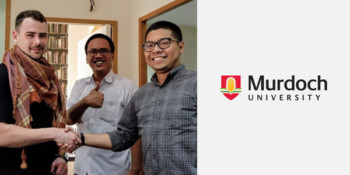Kade Stone is a participant in the 2019 Law Professional Practicum from Murdoch University. Kade is studying a Bachelor of Laws and a Bachelor of Arts majoring in Global Politics and Policy. Kade received a $3,000 New Colombo Plan Mobility Grant to support his participation in this program.
Q: Why did you decide to undertake the ACICIS Law Professional Practicum?
I decided that, to get the most out of my university experience, I should travel and study overseas for a little while. I had travelled through South-East Asia before and felt that Indonesia would be an interesting country to further explore and learn about. I had little interest in staying in Australia over the summer break and frankly, wanted to do something a little different to the norm.
Q: Did you receive a New Colombo Plan Mobility Grant? If so, how did this contribute to your experience in Indonesia?
I did receive an NCP grant and this grant allowed me to travel overseas for just under two months and not worry about money. The grant removed a lot of financial stress that I would otherwise have faced. I have moved out of home and am self-reliant, but a trip of this length would have required extensive saving had I not received this grant.
Q: How will the Law Professional Practicum benefit or influence your future career?
The Professional Practicum mixed an internship, language course, seminars in my field (Law) and field trips to significant locations within Jakarta. I have learnt how to work in a foreign country, make international contacts and friends. From humble beginnings, I learnt how to do academic level legal and public policy research. I will definitely be adding this program to my resume. This program also showed me that a career in public policy research is a viable and enjoyable option for my future.
Q: Which organisation are you interning with? What are your roles and responsibilities?
I interned with PSHK (Centre for Indonesian Law and Policy Studies). I contributed to legal research on non-conviction-based asset forfeiture and recovery (NCP) on a large, multi-author report. My research focussed on how NCP works in different jurisdictions and the pros and cons of this method compared to conviction-based asset forfeiture. I also attended several seminars, meetings and exhibitions with my workplace.
Q: How have you found the work culture of your host organisation? How is it different to work experience in Australia?
The culture was initially very different. Hours are very flexible and most of my colleagues would not come to work until 10.30-11am but would finish later than is normal. Laissez faire management allowed staff to conduct their roles in whatever fashion they deemed best. Many of my work colleagues were practicing Muslims and prayer was strictly adhered to.
Q: Would you like to return to work in Indonesia again in future?
I can definitely see Indonesia in my future. If I can get into DFAT and work in an embassy or consulate, that would be a dream come true.
Q: What do you like to do in your spare time in Indonesia?
I enjoyed going to all the usual tourist spots, hanging out with friends at malls and bars and traveling within Indonesia on the weekends.
Q: Favourite place to eat? Favourite Indonesian food?
My favourite place to eat was Martabak Orins and my favourite dish was Martabak, a decadent pancake-esque sweet. Honourable mentions go to gado-gado (mix-mix), Indonesian wine and the ubiquitous bintang for drinks.
Q: Favourite Indonesian word/phrase?
Kamu sangat gila
Q: What places in Indonesia have you visited during your practicum so far?
I have visited Bandung and Bogor. I really enjoyed Bandung and found it to be a breath of fresh air compared to Jakarta. I intended to travel more but became sick near the end of my trip.


